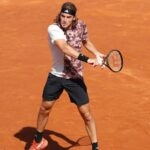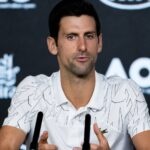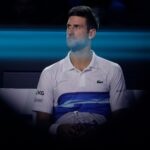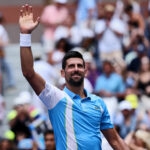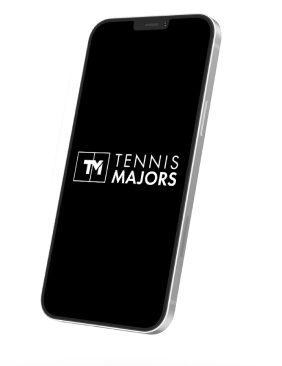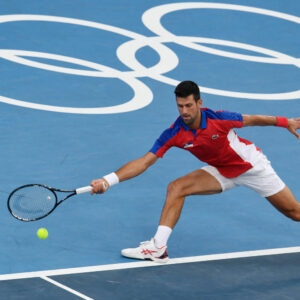Djokovic urged to open his medical file before controversial arrival in Australia
Novak Djokovic is not completely out of the woods after his medical exemption to play the Australian Open
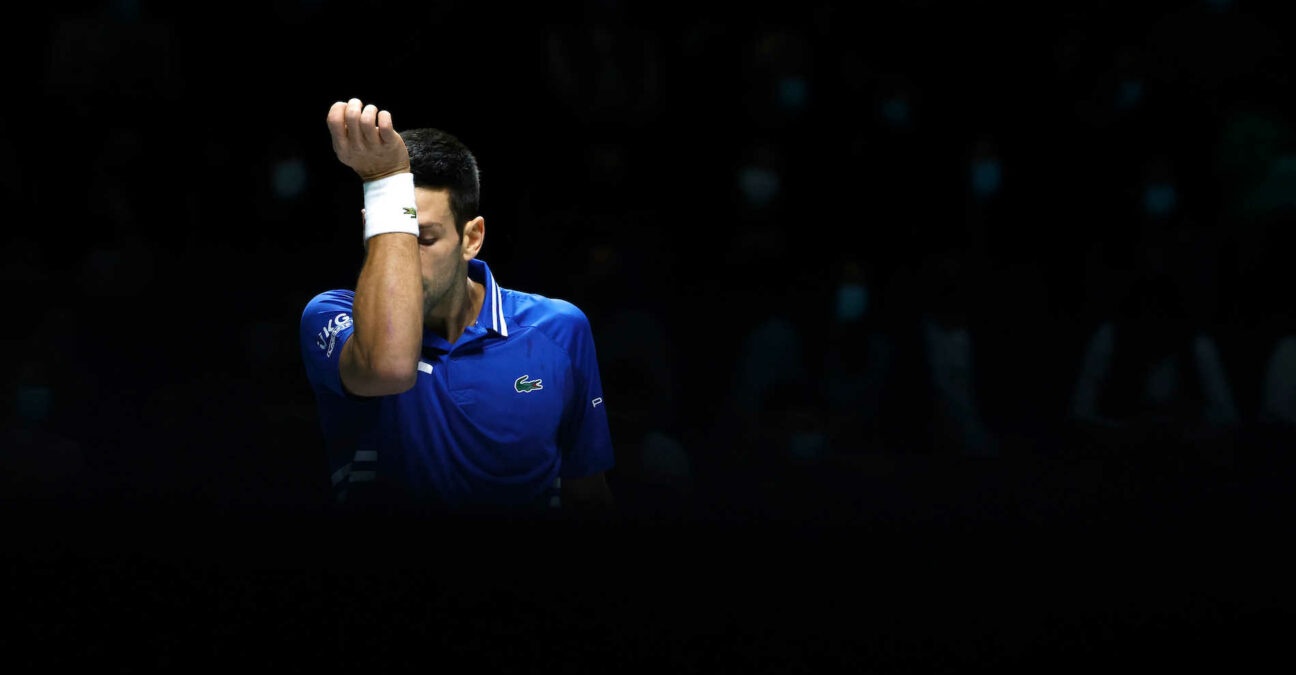 Tennis – Davis Cup Semi-Finals – Serbia v Croatia – La Caja Magica, Madrid, Spain – December 3, 2021 Serbia’s Novak Djokovic in action during his match against Croatia’s Marin Cilic || 214482_0035
Tennis – Davis Cup Semi-Finals – Serbia v Croatia – La Caja Magica, Madrid, Spain – December 3, 2021 Serbia’s Novak Djokovic in action during his match against Croatia’s Marin Cilic || 214482_0035
Novak Djokovic had a very high-pressure 2021 season, with his historic quest for a calendar Grand Slam. He’d also hoped to win an Olympic gold medal.
He fell short. “I was just glad that finally the run is over,” he admitted after his on-court emotion during his defeat to Daniil Medvedev in the US Open final.
Despite the past 12 months, the next 12 days may be even more tense – if not hours.
For these episodes now seem obsolete at a time when the world No 1 has flown to Melbourne after confirming his participation in the Australian Open – following a medical exemption allowing him to skip the compulsory vaccination.
It escalated on Wednesday at midnight local time when a reporter from Melbourne’s most important newpaper The Age tweeted that Novak Djokovic has been rejected at the border for a wrong visa. The Age themselves tweeted : “The Victorian government rejected a late-night request from Border Force to support the world No. 1’s visa hours before he landed in Melbourne after it was discovered that Djokovic’s team had submitted the wrong type of visa.”
This highlights Prime Minister Scott Morrison’s statement a few hour sonner.
“Novak Djokovic, when he arrives in Australia, I don’t think you will be too far away…if he is not vaccinated, he must provide acceptable proof that he cannot be vaccinated for medical reasons to be able to access the same travel arrangements as fully vaccinated travellers.
“We await his presentation and what evidence he provides us to support that.
If that evidence is insufficient, then he won’t be treated any differently to anyone else, and he’ll be on the next plane home
Scott Morrison
“If that evidence is insufficient, then he will be treated no different to anyone else and he’ll be on the next plane home. There should be no special rules for Novak Djokovic at all. None whatsoever.”
Djokovic within the 5 per cent of unvaccinated players
Since Tuesday’s announcement courtesy of a post on social networks, Djokovic has been the subject of at best a debate, at worst a torrent of criticism, on one of the most divisive subjects in a world plagued by Covid-19: vaccination and the responsibility of those who refuse to be vaccinated for the health of others.
In making the announcement on Tuesday, Djokovic broke the first barrier. Getting a formal exemption means that the Serbian has continued to behave in line with what he told the New York Times in April 2020, when he said he was shocked at the idea of introducing an external element into his body to be allowed to practice his profession.
Nicknamed “Novax” by some provocateurs on social networks, Djokovic is one of the estimated 5% of players in the ATP Top 100 who have not received a dose by personal choice. He has made this decision public after months of questioning, when previously he refused to elaborate, attributing it to medical confidentiality. Perhaps the logical extension of his behaviour so far would be to skip the Australian Open entirely, as Tennys Sandgren or Pierre-Hugues Herbert have done, and that is why his opponents are presuming the existence of preferential treatment for the world No 1, chasing a record-breaking 21st Grand Slam singles title.
Djokovic’s participation has provoked such powerful emotion in Melbourne, and elsewhere, that it now places him under a virtual obligation to open his medical records and prove that his exemption is not a free pass. Australian Open tournament director Craig Tiley and several leading politicians have already encouraged him to do so.
Tennis Australia guarantees Djokovic’s loyalty
Eager to protect its sporting event from the disastrous spectacle of (inoculated) spectators barracking the world No 1before, during and after each match, Tennis Australia provided the first wave of crisis communication to help Djokovic on his way. It took just over an hour for the Australian Open organisers to issue a statement explaining the medical decision.
“Djokovic applied for a medical exemption which was granted following a rigorous review process involving two separate independent panels of medical experts. One of those was the Independent Medical Exemption Review Panel appointed by the Victorian Department of Health. They assessed all applications to see if they met the Australian Technical Advisory Group on Immunisation (ATAGI) guidelines.”
Put another way: it is the state of Victoria that has decided to open its territory only to those who have been vaccinated, and it is also the state that guarantees that Djokovic has been correctly treated according to the paperwork he submitted. The state of Victoria confirmed this reading of events in a press release. This has led voices such as Dutch coach Sven Groeneveld – openly pro-vax and coach of Bianca Andreescu, who is absent from the Australian Open for personal reasons – to invite those shocked by the situation to blame the local authorities rather than Djokovic, who has submitted a proper application.
26 exemption requests, according to Tennis Australia
Tennis Australia have revealed that they received 26 requests for exemption across all populations (players, coaches, officials, accredited personnel on site). They did not specify the proportion that were declined, but made it clear that the validated applications were in the minority. The implication is that if Djokovic’s request for exemption was accepted, it was because he had a solid case.
This information only increases the pressure on Djokovic to be almost totally transparent with his case. A quick examination of the conditions that could validate an exemption leaves one sceptical as to the criteria that could have favoured him.
Fingers are unsurprisingly pointing towards a criterion that seems more realistic than the others: having been infected with Covid-19 recently.
On paper, none of the other conditions are realistic. Without going into technical medical detail, the terms of which are public and can be found here, the other criteria assume either that the applicant has had a first dose of vaccine and a severe reaction, or that the applicant is too frail not to be at serious risk by being vaccinated. This is incompatible with the regime of a top athlete who is coming off a season at the top, under the almost permanent eye of the cameras.
Was Djokovic ill with Covid-19 in the second half of 2021?
So was Djokovic infected with COVID after 31 July? If he was, he didn’t say so. But he did in June 2020 after a first infection. And if so, it could only have happened in August, October or December. Between the US Open and the Rolex Paris Masters, Djokovic spent time in the Maldives on holiday, but also in training, he recently revealed to L’Equipe. After Serbia’s elimination from the Davis Cup on 4 December, Djokovic spent time at home in Belgrade.
Speaking to The Age, Tennis Australia’s medical director Carolyn Broderick also suggested that a recent Covid infection was the most likely criteria.
“I can’t comment on our group [of 26 applicants], but if you look at an Australian group of people applying for medical exemption, the vast majority are recent Covid-19.”
Broderick also gave The Age, in spite of herself, a piece of information that casts doubt on the rigour of the exemption process. She said that the experts were commissioned to analyse the documents provided to them, but that they had no mandate to carry out a genuine investigation that would lead them to contact the patients’ foreign doctors or the laboratories that conducted the tests.
“In some instances they requested additional information but, no, they wouldn’t have contact with doctors from another country,” she said.
It remains to be seen whether Djokovic was genuinely anonymous to those considering his file. In their press releases, Tennis Australia and the state of Victoria mention personal data protection mechanisms but do not state that the requests were processed anonymously, although Dr Broderick explained: “[The applicants] were totally de-identified when [the panel] were making their decisions. Country of origin was also redacted from the documents…except in cases where age was important, date of birth was redacted.”
The sceptics have already been speaking. Australian MP Trent Zimmerman said the arrival of an unvaccinated Djokovic was “a disgrace”, adding that it was ““It is a slap in the face to every Australian who has been doing the right thing and following health orders – particularly those who have been returning from overseas and making sure they are fully vaccinated.”
British ATP Cup player Jamie Murray suggested that if he had not been vaccinated, he would not have received the same exemption, while Noah Rubin, ranked 391st in the world, told L’Equipe that in his view “the best are always privileged”.
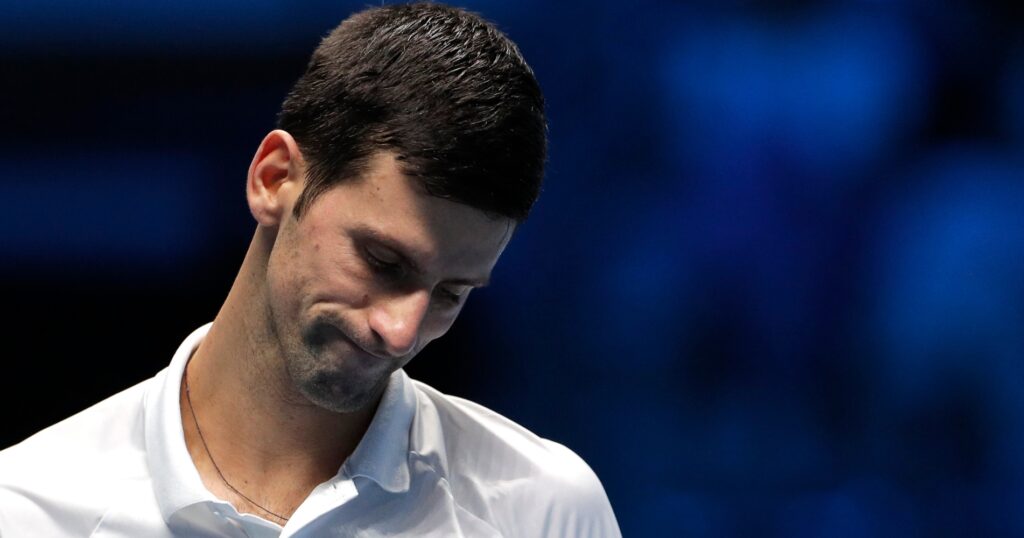
Most of the players interviewed since Tuesday, including some of the world’s elite (such as Alex De Minaur and Diego Schwartzman), have preferred to avoid direct discussion of the issue without hiding that “the locker room” is buzzing with discussion on the subject.
Djokovic has ten days to find the right words that will smooth his path to a normal tournament, free of a toxic relationship with the Australian public. The local population has agreed to abandon the zero Covid strategy and the heavy restrictions that came with it by vaccinating en masse and has been making this known since yesterday on social networks.
But a new storm could nonetheless be approaching Djokovic. The Australian federal authorities have announced that they will intensify their border controls, in a statement that distances themselves from the decisions of Tennis Australia and the state of Victoria.
“Any individual seeking to enter Australia must comply with our strict border requirements,” said home affairs minister Karen Andrews in a statement.
“While the Victorian Government and Tennis Australia may permit a non-vaccinated player to compete in the Australian Open, it is the Commonwealth Government that will enforce our requirements at the Australian border.
“No individual competing at the Australian Open will be afforded any special treatment.”
Djokovic turned away at the border or held against his will upon arrival in Melbourne? The soap opera of his participation in the Australian Open would then hit rock bottom after two months of huge but avoidable tension around the subject. The home affairs minister, at the end of her press release, points out that quarantine requirements for unvaccinated individuals are a responsibility for the state – while entry into the country remains a federal issue. This saga is nowhere near over.
People in this post
More tennis news
Tennis Majors launches new WhatsApp channel: Join us now!

Rouen Open: Kalinina knocks out Mirra Andreeva to make last four
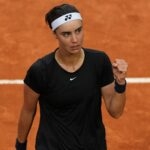
‘Demon’, Hewitt, 109, Acapulco: Everything you always wanted to know about Alex de Minaur (but never had time to find out) – updated after 2024 Barcelona Open

Australian Open, world No 1, Belarus: Everything you always wanted to know about Aryna Sabalenka (but never had time to find out) – updated after 2024 Stuttgart Open
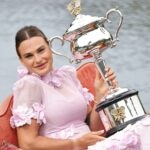
Barcelona Open: Tsitsipas survives scare to beat Diaz Acosta and reach semi-finals
